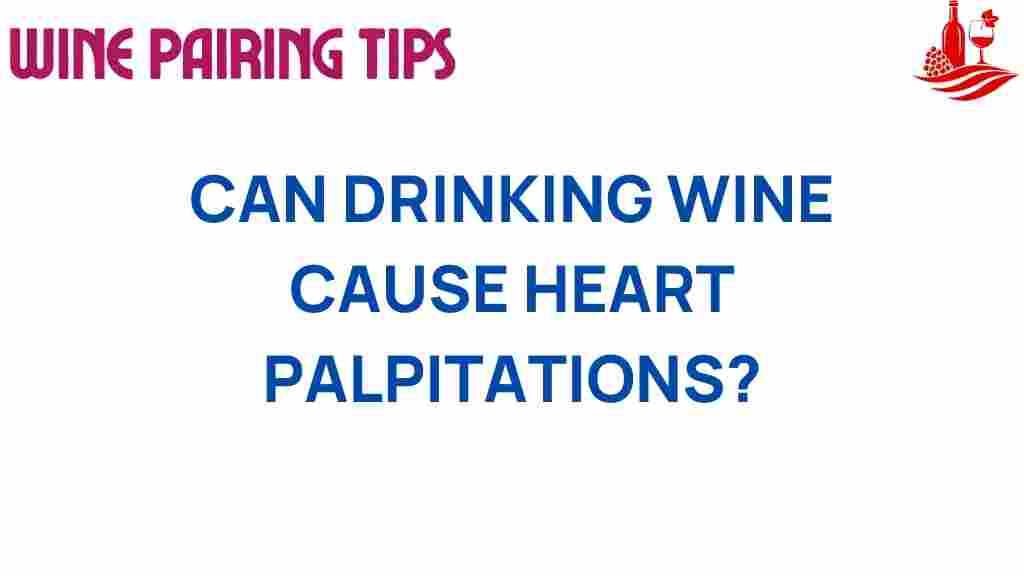Can Drinking Wine Cause Heart Palpitations?
Wine has long been celebrated for its potential health benefits, particularly regarding cardiovascular health. However, with the rise in alcohol consumption, many individuals are left wondering: can drinking wine cause heart palpitations? In this article, we will delve into the relationship between wine, heart palpitations, and the broader implications of alcohol consumption on health. We will uncover the risks associated with excessive drinking, the role of moderation, and lifestyle choices that can help maintain a healthy heart.
Understanding Heart Palpitations
Heart palpitations are feelings of having a fast-beating, fluttering, or pounding heart. They can occur at rest or during activity and are often harmless. However, it is essential to understand their causes, especially if you consume wine or other alcoholic beverages regularly.
- Common Symptoms of Heart Palpitations:
- Racing heartbeat
- Fluttering sensation in the chest
- Lightheadedness or dizziness
- Shortness of breath
- Chest discomfort
If you experience these symptoms after drinking wine, it’s advisable to consult a healthcare professional to rule out any underlying conditions.
How Wine Affects the Heart
Wine, particularly red wine, has been associated with several health benefits, such as improving heart health due to its antioxidant properties. However, the relationship between wine and heart palpitations is complex. Here are some factors to consider:
- Alcohol and Heart Rate: Alcohol can stimulate the heart and cause it to beat faster, potentially leading to palpitations.
- Dehydration: Drinking wine, especially in large quantities, can lead to dehydration, which may exacerbate the feeling of palpitations.
- Histamines and Sulfites: Some individuals are sensitive to histamines and sulfites found in wine, which can trigger heart palpitations.
- Blood Pressure Changes: Alcohol consumption can cause fluctuations in blood pressure, which may also lead to palpitations.
The Risks of Alcohol Consumption
While moderate consumption of wine can have health benefits, excessive drinking poses significant risks, particularly concerning cardiovascular health. Here are some potential risks:
- Increased Heart Rate: Heavy drinking can lead to an increased heart rate and palpitations.
- Atrial Fibrillation: Studies have shown that heavy alcohol consumption can increase the risk of atrial fibrillation, a serious heart condition.
- Weight Gain: Excessive alcohol can lead to weight gain, which is a risk factor for cardiovascular issues.
- Liver Damage: Chronic alcohol consumption can lead to liver damage, affecting overall health and heart function.
Moderation is Key
When it comes to wine and heart health, moderation is vital. The American Heart Association recommends that women limit alcohol consumption to one drink per day and men to two drinks per day. Consuming wine in moderation can help mitigate the risks associated with alcohol and promote cardiovascular health. Here are some tips for responsible wine consumption:
- Choose Quality Over Quantity: Opt for a small glass of high-quality wine rather than several glasses of lower-quality options.
- Pace Yourself: Take your time when drinking wine to enjoy its flavor and to reduce the likelihood of overconsumption.
- Stay Hydrated: Drink water between glasses of wine to maintain hydration and help prevent palpitations.
- Listen to Your Body: Pay attention to how your body reacts to wine. If you notice palpitations, consider reducing your intake.
Lifestyle Factors That Affect Heart Health
Your lifestyle choices play a crucial role in your overall cardiovascular health. Here are some lifestyle modifications that can help improve heart health and potentially reduce heart palpitations:
- Regular Exercise: Engaging in regular physical activity strengthens the heart and improves circulation.
- Balanced Diet: A diet rich in fruits, vegetables, whole grains, and healthy fats can support heart health.
- Stress Management: Practicing relaxation techniques, such as yoga or meditation, can help reduce stress and its impact on heart health.
- Avoid Smoking: Smoking is a significant risk factor for heart disease and should be avoided.
Troubleshooting Tips for Heart Palpitations After Drinking Wine
If you experience heart palpitations after drinking wine, here are some troubleshooting steps to consider:
- Identify Triggers: Keep a diary of your wine consumption and any symptoms experienced to identify potential triggers.
- Reduce Intake: If you notice a pattern, consider reducing your wine consumption or avoiding it altogether.
- Consult a Healthcare Professional: If palpitations persist or worsen, seek medical advice to rule out other health issues.
Conclusion
In conclusion, while moderate wine consumption can offer some health benefits, it is essential to be aware of the potential risks, especially concerning heart palpitations and overall cardiovascular health. Understanding your body’s response to wine and making informed lifestyle choices can help you enjoy wine responsibly while maintaining heart health.
For more information on heart health and alcohol consumption, you can check out the American Heart Association. Remember to always listen to your body and consult with healthcare professionals if you have concerns about your health.
By staying informed and practicing moderation, you can enjoy wine without compromising your cardiovascular health.
This article is in the category Tips and created by Wine Pairing Tips Team
